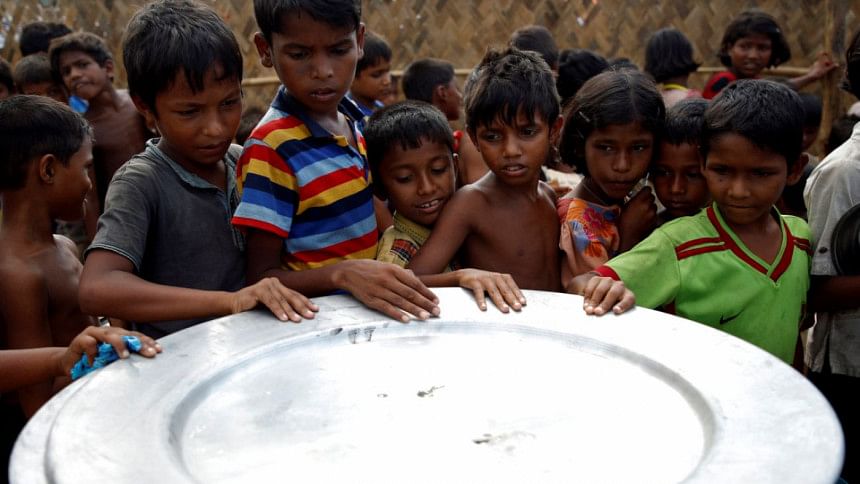Repression in Rakhine, and the principle of the 'responsibility to protect'

In my previous avatar as a diplomat, like much of the rest of the world, I saw myself as an ardent advocate for change in Myanmar. It was in the grip of Generals who ran a horrendously repressive regime. In 2009, urging calm on those who wished to come down hard on the ruling junta, I had written in a publication: "The main challenge with Myanmar is to find the right balance between the carrot and the stick. The balance needs to tilt in favour of the carrot." A decade down the line, circumstances require me to alter that thesis. Today, I would opt for the stick. And much of the rest of the world would agree.
Not so long ago, Aung San Suu Kyi was internationally extolled as a champion who, if afforded the opportunity, could effect the necessary positive transition. With global support she got her chance after winning the elections in 2015. What happened thereafter was a let down by her of gargantuan proportions. As the military pulled wool over the world's eyes by staging a supposed transfer of power to the civilians, she became an active player and partner in the drama. It was a political theatre in which the global audience was taken for a ride.
Aung San Suu Kyi, a Nobel Peace Prize laureate, sadly succumbed to the machinations of her military. She paid, it seems quite willingly which is unfortunate, a hefty moral price for the office she found herself installed in. She appeared to sacrifice some fundamental values of decency, much to the regret of her former admirers. As violence perpetrated by her government made headlines which she did little to prevent, she was stripped of several awards. Even the rescindment of the Nobel Peace Prize has been contemplated. The recent UN Report on atrocities committed by the Burmese against the Rohingyas in Rakhine explains the burgeoning global vitriol against her. She had failed to stand up for the stateless minority, a million of whom were forced in recent times to flee to neighbouring Bangladesh. She and her civilian colleagues are, "through their acts and commissions", seen to have "contributed" to the commission of unspeakable "crimes", as the Report painfully records.
Ms Suu Kyi attributed the military action that led to the indiscriminate burnings, pillage, killing and rapes in Rohingya villages of Rakhine to the "danger of terrorist activities" in a recent speech in Singapore. She said Myanmar had implemented 81 out of 88 recommendations of the Annan Commission, a highly disputed claim. She asserted that it was the responsibility of Bangladesh to determine how quickly the process of return of refugees was to be completed. It was a futile attempt on her part to attempt to create a moral equivalence between Myanmar and Bangladesh that would be a distasteful distortion of reality. The world wasn't buying—132 legislators from ASEAN to which Myanmar belongs, called for an international accountability mechanism to impartially investigate human rights violations in their fellow ASEAN country.
Much earlier, United Nations High Commissioner for Human Rights, Zeid Raad Al Hussein, had called Myanmar's actions a textbook case of "ethnic cleansing". Now comes the report of the UN fact-finding mission that goes much further. The authors of the current document called for six top military generals including commander-in-chief, Min Aung Hlaing, to be investigated and prosecuted for "genocide". Furthermore, they demanded that the generals also be tried for "crimes against humanity and war crimes in Rakhine, Kachin and Shan States". They stressed that given the entrenched culture of impunity in Myanmar's political and legal system, the only chance of accountability was through the international legal system.
So what is the recourse available to the international legal system? In 2005 a summit at the UN General Assembly of world leaders unanimously adopted a norm called the "Responsibility to Protect" or "R2P" in short. I was myself at that time, as a "friend" of the president of the General Assembly, closely associated with crafting the language, though at that time this particular situation was totally unforeseen. Simply put, the principle stated that it was the duty of every state to protect their own populations. Should it be unwilling or unable to do so, this responsibility would devolve on the international community. However it would have to be discharged by collective action through the Security Council. There was a caveat, though, designed to prevent unilateral action, such as was undertaken by the West in invading Iraq in 2003. It was that R2P could only be initiated when one, some, or all of the following occurred: "genocide, war-crimes, ethnic cleansing, and crimes against humanity". In remarkably calculated use of terminologies the UN officials have, at different times, referred to all four situations as obtaining in Myanmar, thus actually clearing the legal way for the Security Council to apply the principle of the R2P. It is worth noting though that R2P could also take the form of developmental support that could create positive conditions to enable the avoidance of the ultimate tool, military intervention.
But UN officials do not decide on such matters. Member States do. In the Security Council the passage of any such call to action will be rendered difficult due to the veto powers of China and Russia. Either, or both, if past actions are a guide, are likely to prevent any adoption that could contain the possibility of application of force in Myanmar. So the Security Council is unlikely to be a medium for the resolution of the problem. The most directly concerned country in this issue is, of course, Bangladesh. Any forcible regime change in Naypyidaw would not be seen by Bangladesh in positive light. For one thing, external intervention is something that Bangladesh could not support in principle, because such phenomena enhance the vulnerability of weak states vis-a-vis the strong. Second, it could turn Bangladesh into something like a Pakistan to Myanmar's Afghanistan. And third it would divert world attention to the military action, or any war, away from the resolution of the refugee crisis, which is in Bangladesh's primary interest.
But there are also other options. It is understood that there is enough evidence to bring the named accused to book. The fact that Myanmar is not a member of the International Criminal Court (ICC) need not stand in the way. There is ample precedence for special tribunals, as in the case of Rwanda, for the purpose. The world must be made too small a place for criminals of such ilk to hide. Targeted sanctions, covering travels and bank accounts, including of dependents, would be a deterrent. For proven offences, international arrest warrants could be also contemplated. Such individual actions, however limited their impact, are still better than military interventions which oftentimes spill innocent blood. The United States is shy of using the term "genocide" in this context, not because it doubts that it is the case, but because it would then compel them to take some actions under American law, that they may not be ready for yet. The issue may be low on President Donald Trump's priorities, but Ambassador Nikki Haley is substantially energised and may be poised to make a difference, both at the UN and in Washington. The European Union has an opportunity to display its commitment to human rights, and now is a chance to demonstrate the values it prides in.
In February 1972, as a young commerce ministry official, I had accompanied Foreign Secretary SA Karim in the first ever delegation to Rangoon from the newly independent Bangladesh. In a meeting with the Burmese Foreign Minister Colonel Hla Han we requested the return of the Pakistani aircraft flown out to safe haven in Burma around mid-December in 1971. He refused. The colonels of yesteryear have been replaced today by generals in their power-scheme. Nonetheless the obduracy has remained a constant rather than a variable in their behaviour. Those days Burma operated on the periphery of the global system. According to Ralph Pettman, a distinguished Australian analyst, Burma had actually chosen to opt out of it. At present times, for a variety of reasons including the Rohingya crisis, Myanmar is more centrally located on the matrix. It also has the searchlight of curiosity turned on them. Perhaps they will now learn that the arc of the moral universe, however long, is ultimately bent towards justice. The sooner they do so the better for them, and for the world.
Dr Iftekhar Ahmed Chowdhury is a former foreign adviser to a caretaker government of Bangladesh and is currently Principal Research Fellow at the Institute of South Asian Studies, National University of Singapore.

 For all latest news, follow The Daily Star's Google News channel.
For all latest news, follow The Daily Star's Google News channel. 



Comments